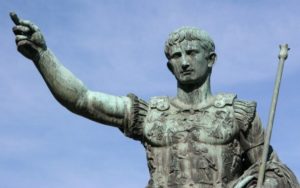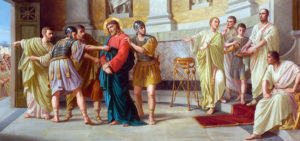Στις αντεγκλήσεις που αφορούν την ιστορικότητα του Ιησού κι αν υπήρξε στ’ αλήθεια ως πρόσωπο ο Χριστός, χρησιμοποιείται πολλές φορές το εποχείρημα της ύπαρξης προσωπικοτήτων για τις οποίες υποτίθεται πως διαθέτουμε πολύ λιγότερα ιστορικά στοιχεία σε σχέση με εκείνα που αφορούν την πρωταγωνιστική φιγούρα του χριστιανισμού, παρόλα αυτά η ιστορική τους ύπαρξη θεωρείται γενικά παραδεκτή.
Είναι όμως έτσι τα πράγματα;
Περίπτωση 1: Σωκράτης

«Θα πρέπει να παραδεχτούμε ότι για λίγες προσωπικότητες της αρχαιότητας διαθέτουμε τόσο πολλές αναμφισβήτητες ιστορικές πληροφορίες, κι έχουμε τόσες πολλές αυθεντικές αναφορές» όσες για τον Ιησού, ενώ «η κατάσταση είναι πολύ λιγότερο θετική, για παράδειγμα, στην περίπτωση του Σωκράτη»
Σοβαρά; Για να δούμε πόσο αληθινό είναι αυτό.
Ο Σωκράτης ήταν ένας φημισμένος σοφός άνθρωπος, ήταν η σπίθα που τελικά πυροδότησε τη φιλοσοφία ως επιστήμη όπως την ξέρουμε σήμερα. Εκτελέστηκε στην Αθήνα το 399 π.Χ. επειδή αμφισβήτησε το status quo. Αναδείχτηκε ως ο πιο σοφός άνθρωπος του αρχαίου κόσμου. Αλλά αυτό είναι λογικό. Διότι γνωρίζουμε τα ονόματα πολυάριθμων αυτοπτών μαρτύρων που έγραψαν βιβλία γι’ αυτόν, συμπεριλαμβανομένων τουλάχιστον δεκαέξι μαθητών του.
Για το αν υπήρξε ο Χριστός δεν υπάρχει βιβλίο που να έχει γραφτεί. Σε μερικές περιπτώσεις ξέρουμε ακόμη και τους τίτλους των βιβλίων για τον Σωκράτη, και πολλές παραφράσεις ή αποσπάσματα από αυτά βρίσκονται διασωθέντα σε άλλες πηγές. Στην πραγματικότητα, έχουμε δύο από αυτά.
Τα οποία γράφτηκαν μέσα σε λίγα χρόνια μετά τον θάνατό του, κι όχι μισό αιώνα αργότερα ή και περισσότερο (όπως γράφτηκαν τα Ευαγγέλια για τον Ιησού), κι ούτε σε ξένη χώρα και γλώσσα. Ήδη αυτά είναι πολύ περισσότερα απ’ όσα έχουμε για τον Ιησού. Όσο για εκείνους τους δύο αυτόπτες μάρτυρες; Ήταν οι μαθητές του Σωκράτη, Πλάτων και Ξενοφών, οι οποίοι μαζί έγραψαν αρκετά βιβλία γι’ αυτόν.
Έτσι λοιπόν δεν έχουμε μόνο πολλαπλούς αυτόπτες μάρτυρες που μιλούν για τον Σωκράτη μέσα σε λίγα χρόνια από τον θάνατό του, αλλά έχουμε και τη μαρτυρία ενός προσώπου σχετικά εχθρικού προς αυτόν, έξω και πέρα από τον κύκλο των φανατικών μαθητών του. Πρόκειται για τον Αθηναίο σατιρικό ποιητή Αριστοφάνη που παρουσίασε μια κωμωδία με την οποία ευγενικά διακωμωδεί τον Σωκράτη, τη σχολή του και τους μαθητές του. Το έργο, με τίτλο Νεφέλες, διασώζεται μέχρι σήμερα.
Ο Αριστοφάνης όχι μόνο γνώριζε προσωπικά τον Σωκράτη και στήριξε την κωμωδία του στην άμεση γνώση που είχε γι’ αυτόν και τη σχολή του, αλλά όπως κατέγραψαν οι μεταγενέστεροι ιστορικοί (βασισμένοι σε πηγές σύγχρονων αυτοπτών μαρτύρων) ο Σωκράτης βρισκόταν στις κερκίδες ανάμεσα στους θεατές της πρώτης παρουσίασης του έργου. Αν είχαμε μια τέτοια ανεκτίμητη πηγή για το αν υπήρξε στ’ αλήθεια Χριστός! Μα δυστυχώς δεν έχουμε. Δεν υπάρχουν καθόλου ουδέτερες ή ανεξάρτητες καταγραφές για το αν υπήρξε Χριστός. Διαθέτουμε μόνο μεταγενέστερο υλικό γραμμένο από φανατικούς και δοξαστικούς πιστούς, οι οποίοι συνθέτουν την πιο προκατειλημμένη πηγή που μπορεί να υπάρξει. Όπως μόλις είδαμε στο τελευταίο Κεφάλαιο, οι οποιεσδήποτε μικρές αναφορές που έγιναν από τους μη Χριστιανούς ιστορικούς ήταν απλά επανάληψη των όσων είχαν αναφέρει αυτές οι μεταγενέστερες φανατικές χριστιανικές πηγές – ή είχαν εξολοκλήρου κατασκευαστεί από φανατικούς Χριστιανούς!
Έτσι, ακόμη και σε αυτό μόνο το σημείο, ξανά έχουμε πολύ καλύτερες αποδείξεις για τον Σωκράτη παρά για τον Ιησού. Όμως δεν είναι μόνο αυτά που διαθέτουμε. Έχουμε και πολλούς συγχρόνους του που καταθέτουν για την ιστορική ύπαρξη του Σωκράτη. Για τον Ιησού δεν έχουμε κανέναν – πλην ενός ουράνιου πλάσματος. Και αρκετοί ιστορικοί του Σωκράτη, χρονολογημένοι περίπου έναν αιώνα μετά, συνέλεξαν υλικό από τους συγχρόνους του και τους αυτόπτες μάρτυρες, υλικό από το οποίο συνέθεσαν εξιστορήσεις και βιογραφίες αυτού του ανθρώπου. Ανάμεσά τους ο Ιδομενεύς, που έγραψε το Περί των Σωκρατικών, αποσπάσματα του οποίου έχουν διασωθεί. Συνολικά, οι σωζόμενες μαρτυρίες και οι παραθέσεις των λόγων του Σωκράτη από τους αυτόπτες και συγχρόνους του γεμίζουν τους τέσσερις τόμους του έργου Socratis et Socraticorum Reliquiae του Gabriele Giannantoni που εκδόθηκε το 1990. Αυτά όλα είναι τόσο πολύ περισσότερα απ’ όσα έχουμε για τον Ιησού, που πραγματικά σαστίζει κανείς όταν σκεφτεί πώς γίνεται κάποιος να μπορεί να λέει ότι έχουμε περισσότερα στοιχεία για τον Ιησού απ’ ό,τι για τον Σωκράτη!
Αν ο Σωκράτης είχε λατρευτεί αμέσως ως αναστημένος Υιός του Θεού, Σωτήρας του Σύμπαντος, του οποίου η βιογραφία και τα κηρύγματα θα έπρεπε κατεπειγόντως να διαδοθούν σ’ όλο τον κόσμο για το καλό της ανθρωπότητας, κι αν οι οπαδοί του αποκτούσαν τον έλεγχο του συνόλου των κοινωνικών μηχανισμών μέσα σε τρεις αιώνες, τότε θα μπορούσαμε να έχουμε ακόμη περισσότερες αποδείξεις απ’ όσες έχουμε ήδη. Οι δεκάδες μαρτυρίες αυτοπτών και σύγχρονες αναφορές τις οποίες γνωρίζουμε αλλά έχουμε μόνο παραπομπές ή αποσπάσματά τους (και περισσότερες που δεν γνωρίζουμε) σίγουρα θα είχαν διασωθεί από αυτή την «Εκκλησία του Σωκράτη» η οποία ήλεγχε όλη τη φύλαξη και παραγωγή βιβλίων επί μία χιλιετία μετά τον τρίτο μ.Χ. αιώνα. Θα τα είχαμε όλα αυτά. Συν όλα όσα ήδη έχουμε.
Για ποιο λόγο όμως δεν υπήρξε ανάλογη παραγωγή και φύλαξη μαρτυριών και σύγχρονων αναφορών για τον Ιησού;
Το μόνο που μπορούμε να υποθέσουμε είναι απλώς επειδή δεν γράφτηκε τίποτε. Ή ότι κανείς δεν μπορούσε να διαφυλάξει τέτοιου είδους καταγραφές ούτε καν για να τις μνημονεύσει μόνο. Ή κάποιος τις κατέστρεψε. Μία, δυο, τρεις απαντήσεις. Διαλέξτε από αυτές, κατά την κρίση σας. Ο Σωκράτης μοιάζει πολύ με τον Ιησού στο ότι ήταν μάλλον φημισμένος, διακεκριμένος και σεβαστός διδάσκαλος που ο ίδιος δεν έγραψε ποτέ κάτι, αλλά που είχε μαθητές οι οποίοι ανέλαβαν να διαδώσουν τα διδάγματά του, διαιωνίζοντας έτσι τη φήμη του. Οι οπαδοί του Σωκράτη και οι απόγονοί τους παρομοίως διασπάστηκαν σε ανταγωνιστικές αιρέσεις, που οδήγησαν στην εμφάνιση διαφορετικών φιλοσοφικών σχολών, από την Πλατωνική και την Αριστοτελική ως την Κυνική και τον Στωικισμό, και μερικών άλλων λιγότερο διαδεδομένων.
Η επιρροή της σκέψης του στη δυτική κοινωνία υπήρξε τεράστια, αγγίζοντας ως τον πυρήνα κάθε πτυχή των ιδεών μας σήμερα, από την επιστήμη ως τη δημοκρατία. Όμως ο Σωκράτης δεν μοιάζει καθόλου με τον Ιησού στο ότι ποτέ δεν λατρεύτηκε ως σωτήρας θεός που εμφανίστηκε σε οράματα προερχόμενος από το εξωτερικό διάστημα. Υπήρξαν και θρύλοι που εφευρέθηκαν γι’ αυτόν.
Ποτέ όμως δεν μυθοποιήθηκε όπως ο Ιησούς. Ούτε κατά προσέγγιση. Το αντίθετο έγινε.
Ο Σωκράτης ανήκει στην κατηγορία εκείνων που ιδρύουν σχολές σκέψης σε έναν περιβάλλοντα πολιτισμό που ευνοεί πολύ την ίδρυση σχολών σκέψης. Ο Ιησούς ανήκει στην κατηγορία των κοσμοσωτήριων θεών και αρχαγγέλων εξ ύψους – ενταγμένος μέσα σε μια κουλτούρα που ευνοεί πολύ την ανακάλυψη κοσμοσωτήριων θεών και αρχαγγέλων εξ ύψους. Δεν είναι το ίδιο πράγμα. Κι οι αποδείξεις επικυρώνουν αυτή τη διαφορά.
Περίπτωση 2: Ιούλιος Καίσαρ

«Το αν υπήρξε όντως Χριστός είναι τόσο αυταπόδεικτο για κάθε αμερόληπτο ιστορικό, όσο και η ιστορικότητα του Ιουλίου Καίσαρα»
Αλήθεια; Για να δούμε κατά πόσο ισχύει αυτό.
Ο Ιούλιος Καίσαρ, φυσικά, δεν ήταν «ο τύπος της ομώνυμης σαλάτας» όπως τον θέλουν οι Bill και Ted στο σίριαλ Bill and Ted’ s Excellent Adventure2. Στην πραγματικότητα ήταν «ο πρώτος της Αυτοκρατορίας και ο έσχατος των Ρεπουμπλικάνων της Ρώμης» όπως δηλώνεται από το άβατάρ του στους στίχους της ραπ μπάντας Epic Rap Battles. Και για την περίπτωσή του, διαθέτουμε μία από τις καλύτερες αποδείξεις που μπορεί να βρεθούν για την ύπαρξη κάποιου: έχουμε τα κείμενα που έγραψε ο ίδιος. Ο Καίσαρας έγραψε για πολλούς από τους πολέμους του, όπως και για τον ρόλο του στον ρωμαϊκό εμφύλιο πόλεμο. Διασώζονται σήμερα αντίγραφα εκείνων των βιβλίων του. Ο Χριστός, αντίθετα, δεν έγραψε τίποτε σε κάποιο βιβλίο.
Έχουμε αναφορές συγχρόνων του Καίσαρα οι οποίοι τον γνώριζαν προσωπικά και γράφουν γι’ αυτόν σε πολλές σωζόμενες επιστολές, όπως ο Κικέρων και ο Πομπήιος. Ανάλογες πηγές για το αν υπήρξε Χριστός δεν υπάρχουν. Πολλοί σύγχρονοι του Καίσαρα που τον γνώριζαν προσωπικά έγραψαν γι’ αυτόν σε βιβλία που σώζονται ως σήμερα και μπορούμε να τα διαβάσουμε κι εμείς, όπως είναι οι ποιητές Βιργίλιος, Οβίδιος και Κάτουλος · όπως επίσης εκείνοι των οποίων σώζονται αποσπάσματα έργων τους, όπως ο ιστορικός Τίτος Λίβιος · και πολλοί άλλοι των οποίων τα βιβλία γνωρίζουμε ότι υπήρξαν.
Επίσης από άλλους, που απλώς ήταν σύγχρονοί του, έχουμε γραπτά, όπως από τον γεωγράφο Στράβωνα και τον βιογράφο Νικόλαο τον Δαμασκηνό, και, φυσικά, από πολλούς ιστορικούς κατά τα χρόνια αμέσως μετά τον θάνατό του, από τον Βέλλιο Πατέρκουλο και μετά, ο οποίος συμβουλεύτηκε τα πρώτα κείμενα αλλά και τα κατοπινά. Τέτοιες πηγές για τον Ιησού δεν υπάρχουν.
Επιπλέον, έχουμε μαρτυρίες για τον Καίσαρα όχι μόνο από αυτόπτες μάρτυρες και συγχρόνους του ή αμέσως μεταγενέστερους ιστορικούς, αλλά και από έναν στενό φίλο και οπαδό του, τον Σαλλούστιο – όχι μόνο στο διασωθέν έργο του Σαλλούστιου «Ο Πόλεμος με τον Καταλίνα», αλλά και σε αποσπάσματα από τις «Ιστορίες» του Σαλλούστιου, έργο που αποτελεί τη δική του αποτίμηση της Ρωμαϊκής Ιστορίας, συμπεριλαμβανομένων και των υποθέσεων του Καίσαρα. Για το αν υπήρξε ο Χριστός, δεν υπάρχουν τέτοιες πηγές ή κάποιο αντίστοιχο βιβλίο
Στην πραγματικότητα έχουμε επιγραφές γραμμένες και αναρτημένες από τον ίδιο τον Ιούλιο Καίσαρα. Και φυσικά αμέτρητα νομίσματα τα οποία κόπηκαν κατ’ εντολήν του, επιβεβαιώνοντας την ύπαρξή του, τα χαρακτηριστικά του προσώπου του, τα κατορθώματά του, τα αξιώματά του και την ηγεμονία του. Έχουμε ακόμη και αγάλματα που τον αναπαριστούν, για τα οποία πόζαρε ο ίδιος! Δεν υπάρχει ούτε μία από αυτές τις αδιαμφισβήτητες αποδείξεις για να βεβαιωθούμε ότι υπήρξε ο Χριστός, όπως παρατηρούμε μέχρι στιγμής και στο βιβλίο.
Τα Ευαγγέλια δεν είναι καταθέσεις αυτοπτών μαρτύρων, δεν κατονομάζουν πηγές από αυτόπτες μάρτυρες και δεν μας δίνουν επαληθεύσιμες πηγές από αυτόπτες μάρτυρες. Δεν υπάρχουν μαρτυρίες αυτοπτών για το ότι υπήρξε στην πραγματικότητα Χριστός. Για τον Καίσαρα υπάρχουν τουλάχιστον εννέα που έχουν διασωθεί.
Πώς μπορεί λοιπόν ο Ιησούς να επιβεβαιωθεί το ίδιο καλά όπως ο Καίσαρας;
Του οποίου η επιβεβαίωση γίνεται από στοιχεία που, ξέχωρα απ’ όλες τις επιγραφές και τα αγάλματα σε μάρμαρα ή σε κτίρια και νομίσματα, φτιαγμένα κατ’ εντολήν του ίδιου του Καίσαρα ή εκείνων που τον γνώριζαν προσωπικά, είναι και πάλι πολύ περισσότερα απ’ όσα έχουμε για τον Ιησού. Οι απλοί ισχυρισμοί δεν έχουν νόημα. Ωστόσο έχουμε Χριστιανούς μελετητές όπως ο Darrell Bock που επιμένουν ακόμη να ισχυρίζονται ότι «η ιστορία του Χριστού είναι το ίδιο καλά επιβεβαιωμένη όπως και του Καίσαρα».
Περίπτωση 3: Πόντιος Πιλάτος

«Για την πιο ισχυρή και σπουδαία προσωπικότητα της εποχής του, τον Πόντιο Πιλάτο … ούτε καν» γίνεται «μνεία σε οποιασδήποτε σύγχρονή του, ρωμαϊκή πηγή»
Ο Φίλων ο Αλεξανδρεύς ήταν σύγχρονος του Πόντιου Πιλάτου. Κι ήταν Ρωμαίος με κάθε έννοια. Αν και ελληνόφωνος Ιουδαίος που ζούσε στη ρωμαϊκή επαρχία της Αιγύπτου -που γειτόνευε με τη ρωμαϊκή επαρχία της Ιουδαίας, την οποία ο Φίλων, καθ’ ομολογία του, την επισκέφτηκε για προσκύνημα τουλάχιστον μία φορά- ο Φίλων ήταν με βεβαιότητα Ρωμαίος πολίτης. Κι όχι μόνο ήταν ένας φημισμένος και πλούσιος Αλεξανδρινός, με το αξίωμα του πρεσβευτή προς τον αυτοκράτορα, αλλά ήταν και θείος του Τιβέριου Ιουλίου Αλέξανδρου, Ρωμαίου κυβερνητικού αξιωματούχου. Ο Φίλων όχι μόνο έζησε κατά την περίοδο της διακυβέρνησης της Ιουδαίας από τον Πόντιο Πιλάτο, αλλά επίσης συνέγραψε κι ολόκληρο βιβλίο για τον Πιλάτο. Αυτό το γνωρίζουμε επειδή το δηλώνει ο ίδιος στα διασωθέντα κείμενά του.
Υπάρχει όμως κι ένας Χριστιανός ιστορικός του τέταρτου αιώνα, ο Ευσέβιος, που μας δηλώνει ότι διάβασε το βιβλίο αυτό (στο Εκκλησιαστική Ιστορία 2.5).
Ο Φίλων, επίσης, περιγράφει ένα περιστατικό στο οποίο σκιαγραφείται ο Πόντιος Πιλάτος, σε ένα άλλο βιβλίο του που έχει διασωθεί, γραμμένο κατά τη δεκαετία του 40 μ.Χ., όχι πολύ μετά την αυτοκτονία του Πιλάτου κατά την εποχή της βασιλείας του Καλιγούλα, γεγονός που ο Φίλων το είχε συμπεριλάβει στο χαμένο βιβλίο του για τον Πιλάτο (όπως μπορείτε να δείτε στο Πρεσβεία προς Γάιον 299-305 και στo βιβλίο του Ευσέβιου Εκκλησιαστική Ιστορία 2.7). Αυτά όσον αφορά το ότι ο Πιλάτος δεν μνημονεύτηκε σε καμία ρωμαϊκή πηγή της εποχής του.
Πολλά στοιχεία για τον Πιλάτο και όχι για πρόσωπα όπως ο Χριστός όμως, έχουμε και στο βιβλίο του Ιώσηπου Περί του Ιουδαϊκού Πολέμου, που γράφτηκε κατά τη δεκαετία του 70 μ.Χ. και Ιουδαϊκή Αρχαιολογία που γράφτηκε το 93 μ.Χ. σε μια χρονική απόσταση από την εποχή που ζούσε ο Πιλάτος ίση με την απόσταση των Ευαγγελίων από την εποχή του Ιησού.
Ο Ιώσηπος αναφέρθηκε λεπτομερώς στον Πιλάτο επειδή η διακυβέρνηση της Ιουδαίας από αυτόν κατά το διάστημα από το 26 μέχρι το 36 μ.Χ. υπήρξε από τις πλέον καθοριστικές περιόδους που οδήγησαν στην τελική καταστροφή του ιουδαϊκού κράτους. Αν και ο Ιώσηπος, ο οποίος έγραψε για τα γεγονότα αυτά μία ζωή αργότερα, ήταν ακόμη ένας ελληνόφωνος Ιουδαίος -που χρημάτισε κάποτε και κυβερνήτης της Γαλιλαίας- ταυτόχρονα ήταν και Ρωμαίος πολίτης και πέρασε μεγάλο μέρος της ζωής του στην ίδια τη Ρώμη. Και γνωρίζουμε ότι χρησιμοποίησε προγενέστερες πηγές για τις περιγραφές του (συχνά τις κατονομάζει ή τις μνημονεύει).
Ο Ιώσηπος γεννήθηκε μόλις λίγα χρόνια μετά τον θάνατο του Πιλάτου, οπότε δεν είναι ακριβώς σύγχρονός του. Αλλά, ακόμη κι έτσι, δεν έχουμε κάτι αντίστοιχο για το αν υπήρξε όντως ο Χριστός, μια λεπτομερή περιγραφή κάποιου τρίτου ορθολογιστή ιστορικού, που να χρησιμοποιεί προγενέστερες σύγχρονες πηγές. (Όπως έχουμε επισημάνει ήδη, ο πραγματικός Ιώσηπος πιθανώς να μην έγραψε ποτέ κάποιο βιβλίο στο οποίο αναφέρεται ο Χριστός). Ούτε έχουμε κάποια παρόμοια, σαν του Φίλωνος, λεπτομερή καταγραφή από τρίτους, που να είναι χρονολογικά σχεδόν σύγχρονη με τον Ιησού.
Είναι πολύ παράξενο, όμως, που οι Χριστιανοί της μεσαιωνικής περιόδου δεν φρόντισαν να διαφυλάξουν το βιβλίο του Φίλωνος για τον Πιλάτο.
Διέσωσαν δεκάδες άλλους τόμους του – αλλά αυτό το συγκεκριμένο το άφησαν να χαθεί. Γιατί; Ο πιθανότερος λόγος εκτιμάται ότι ήταν το γεγονός ότι πουθενά μέσα σε αυτό δεν ανέφερε το αν ή όχι υπήρξε ο Χριστός. Κι ένα βιβλίο που αφορά ολόκληρη την περίοδο κατά την οποία κυβέρνησε ο Πόντιος Πιλάτος και δεν αντιλαμβάνεται την παρουσία του Ιησού, είτε θεωρήθηκε άνευ ενδιαφέροντος είτε κρίθηκε ενοχλητικό για τους μετέπειτα Χριστιανούς αναγνώστες του.
Όμως, για έναν διαπρεπή ιστορικό όπως είναι ο Bart Ehrman, το να ξεχνά ότι ο Φίλων μίλησε για τον Πόντιο Πιλάτο, και στα βιβλία του που σώθηκαν και σε εκείνα που χάθηκαν, και αντίθετα, να παραπλανά το κοινό γράφοντας σε ένα από τα μεγαλύτερα περιοδικά ότι κανείς σύγχρονος του Πιλάτου δεν τον μνημόνευσε, είναι κάτι πραγματικά πολύ περίεργο. Για ποιο λόγο θα μπορούσε να το κάνει αυτό;
Μήπως οι ιστορικοί επιμένουν από βιβλίο σε βιβλίο να επαναλαμβάνουν γελοία πράγματα όπως αυτό, μόνο και μόνο για να πείσουν το κοινό ότι οι αποδείξεις για το ότι υπήρξε Χριστός είναι τόσο ισχυρές όσο και για όλους τους άλλους φημισμένους; Διότι εδώ, δεν πρόκειται για μεμονωμένη περίπτωση. Παρόμοιες συμπεριφορές σημειώνονται συνέχεια. Έχουμε δει τη μία περίπτωση μετά την άλλη. Κι αυτές οι συμπεριφορές αντιγράφονται και επαναλαμβάνονται χωρίς τέλος. Άρα λοιπόν υπάρχει κάποιος συγκεκριμένος σκοπός για όλα αυτά.
Όποιος κι αν είναι αυτός ο σκοπός, το αποτέλεσμα είναι ότι θέτει υπό αμφισβήτηση την κρίση και την αξιοπιστία της ακαδημαϊκής συναίνεσης υπέρ της ιστορικότητας του Ιησού. Διότι αυτή η συναίνεση υποστηρίζεται από μελετητές, οι οποίοι θα έπρεπε να αντιλαμβάνονται καλύτερα τα στοιχεία αντί να αρκούνται σε γελοίους ισχυρισμούς σαν και τους παραπάνω. Γεγονός που καθιστά τη συναίνεσή τους ύποπτη.

Τελικά, στο βιβλίο του για το αν υπήρξε στ’ αλήθεια ο Χριστός, με τίτλο “Did Jesus Exist?” ο Ehrman παραδέχεται ότι ο Φίλων μνημονεύει τον Πιλάτο – μάλιστα, εκεί παραδέχεται και κάτι άλλο, το οποίο όμως ξεχνά να το πει στους αναγνώστες του στο Huffington Post, ότι πράγματι έχουμε και μια επιγραφή που ανατέθηκε από τον ίδιο τον Πόντιο Πιλάτο, και η οποία πιστοποιεί την ύπαρξή του! Είναι μια λίθινη πλάκα που είχε ενσωματωθεί σε ένα κτιριακό έργο που διεκπεραίωσε ο Πιλάτος στην Ιουδαία, όπου πάνω της μνημονεύεται το όνομά του.
Αυτό το βιβλίο δεν είναι απλά μια αποδεικτική πηγή κάποιου αυτόπτη μάρτυρα ότι υπήρξε Χριστός · είναι ο ίδιος ο Πιλάτος που μας μιλάει. Κι ούτε είναι απλά ο ίδιος ο Πιλάτος που μας μιλάει · είναι η αυθεντική υπογραφή του. Αυτή η επιγραφή δεν είναι κάποιο αντίγραφο που έγινε αιώνες μετά, αλλά η πραγματική σμιλεμένη πέτρα που επέβλεψε και υπέγραψε ο ίδιος ο Πιλάτος. Και το σπουδαιότερο είναι ότι δεν μπορείς να γίνεις πιο Ρωμαίος από έναν Ρωμαίο κυβερνητικό αξιωματούχο που μας λέει ότι υπάρχει, γράφοντάς το στα λατινικά, πάνω σ’ ένα επίσημο κρατικό μνημείο!
Δεν ήταν κάποιος σωτήρας θεός που λατρευόταν ή ουράνιος επισκέπτης από το διάστημα ορατός μόνο σε οράματα. Ήταν απλώς ένας συνηθισμένος κυβερνητικός αξιωματούχος που διαδραμάτισε κάποιο ρόλο στην καθημερινή πολιτική ιστορία του αρχαίου κόσμου. Είναι ακριβώς εκείνος ο τύπος ανθρώπου που πάντα πιστεύουμε ότι υπήρξε εάν δεν έχουμε λόγους να αμφιβάλλουμε γι’ αυτό… αντίθετα με ό,τι συμβαίνει με τις λατρευτικές σωτηριολογικές θεότητες που έρχονται από το διάστημα.
Για το αν ήταν – ή όχι – υπαρκτό πρόσωπο ο Ιησούς Χριστός, το βιβλίο του Richard Carrier από τις Εκδόσεις Δαιδάλεος είναι το ιδανικό ανάγνωσμα για σένα!

